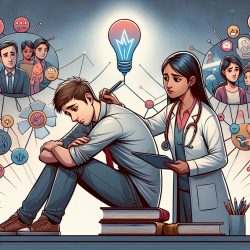Understanding the Role of Informal Primary Caregivers in Student Depression
Depression is a complex disorder that affects not only the individual but also those around them. A recent study titled "Suffering Depression: Illness Perception of Informal Primary Caregivers of Medical Students With Major Depressive Disorder" sheds light on the critical role that informal primary caregivers (IPCs) play in the lives of students with depression. This study, conducted by Robelo-Zarza et al., focuses on the perceptions and experiences of IPCs, often family members, who provide the majority of emotional and basic needs support to these students.
Key Findings from the Study
The research highlights several key findings that can inform practitioners working with depressed students:
- IPCs often lack a comprehensive understanding of depression, leading to feelings of frustration and helplessness.
- Depression in students can exacerbate existing family dynamics, making it crucial for practitioners to consider family context in treatment plans.
- IPCs experience significant emotional and physical strain, which can impact their ability to support the student effectively.
- The stigma associated with mental illness can delay the pursuit of professional help, emphasizing the need for awareness and education.
Implications for Practitioners
For practitioners, these findings underscore the importance of involving IPCs in the treatment process. By understanding the perceptions and challenges faced by caregivers, professionals can tailor interventions to better support both the student and their family. Here are some strategies practitioners can implement:
- Education and Training: Provide IPCs with resources and training to better understand depression and its management.
- Family Involvement: Include family therapy sessions to address and improve family dynamics.
- Support Networks: Encourage the formation of support groups for IPCs to share experiences and coping strategies.
- Stigma Reduction: Work on community outreach programs to reduce stigma and promote mental health literacy.
Encouraging Further Research
While this study provides valuable insights, it also opens the door for further research. Future studies could explore the experiences of IPCs from different cultural backgrounds or examine the long-term impact of depression on family dynamics. Additionally, investigating the role of IPCs in other mental health conditions could provide a more comprehensive understanding of their influence.
For practitioners, staying informed about ongoing research and developments in the field of mental health is crucial. By integrating new findings into practice, professionals can enhance the support they provide to students and their families.
To read the original research paper, please follow this link: Suffering Depression: Illness Perception of Informal Primary Caregivers of Medical Students With Major Depressive Disorder.










